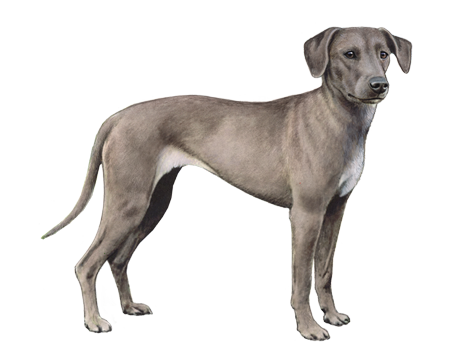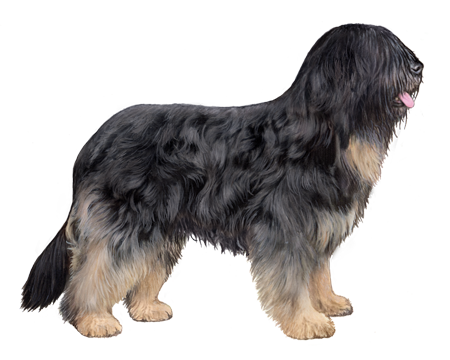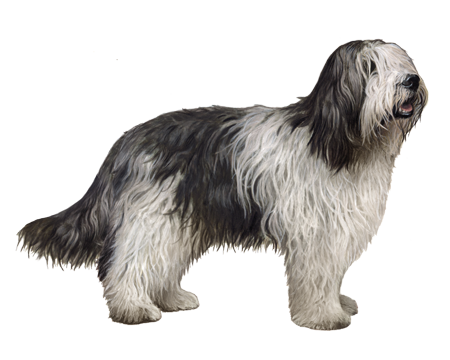
Collie
Collies are devoted pups that love children and thrive on attention and affection. Though originally bred to be working dogs, Collies have also taken on the job of steadfast family companion.
Interested in discovering if your dog is a Collie?
Check out Wisdom Panel's DNA tests.

Collie Traits
General Appearance
Collies are agile, strong dogs with straight, firm bodies that are in harmonious proportion.
Coat and Coloring
This breed comes in two different coats. Smooth Collies have soft, furry undercoats and short, hard, dense, and flat outer coats. Rough Collies also have soft, furry undercoats. But their outer coats are straight and harsh to the touch.
With abundant hair all over their bodies—including the mane and frill—rough Collies are the better-known variety. The hair on their tails and hips is long and busy, whereas the hair on their heads and legs is short.
Collies can be sable and white, tri-color, blue merle, or white. Those with sable and white coats are predominantly sable (a fawn color in shades from light gold to dark mahogany), with white markings on the chest, neck, legs, feet, and tip of the tail. A white blaze may also appear on the foreface, backskull, or both.
Collies with tri-colored coats are predominantly black with white markings and tan shadings on the head and legs. The blue merle coloring is a marbled pattern that is mostly blue-gray and black, with white markings and tan shadings. White Collies are predominantly white with sable, tri-color, or blue merle markings.
Distinctive Physical Traits
Collies have deep chests, and straight, muscular forelegs. Their hocks allow them to move with long, reaching strides and a powerful, propelling gait.
This breed also has a smooth, well-rounded muzzle that tapers from the ears to the nose without flaring. Collies' medium-sized, almond-shaped eyes convey their bright, intelligent nature.
Collie Temperament
Lassie represented the quintessential Collie: A smart, devoted, loyal dog with a particular tenderness toward children. Excellent companions, Collies thrive on companionship and affection. They love nothing more than playing with their people.
Collies are energetic dogs that require regular exercise. As such, they do best in active families that can devote a lot of time to them. And keep in mind, when Collies are bored, they tend to bark.
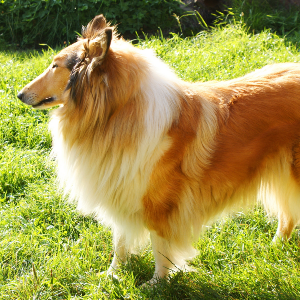
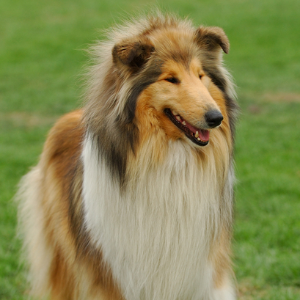
Collie History
When the Romans conquered Britain, Roman herding stock mixed with local dogs to create the breed that came to be known as the Collie. Though their ancestry dates back almost 2,000 years, these humble working dogs were virtually unknown outside of Scotland—where they served as shepherds and guard dogs.
Queen Victoria changed that. She grew fond of Collies during her frequent visits to Balmoral Castle in the Scottish Highlands. And in the late 1800s, she publicly advocated for the herding breed, helping it earn worldwide recognition.
Over the years, Collies acted as guide dogs, water rescue dogs, and movie stars—in addition to herding dogs—thanks to their strong work ethic and incredible skill. One of the breed's more notable roles was the lead in the beloved book (and movie) Lassie Come Home. This helped the breed gain widespread popularity as a family pet—a distinction it still holds today.
Collie Care
Nutrition
Collies need a high-quality dog food formulated for their life stage (e.g., puppy, adult, senior). To avoid overfeeding your dog, measure out meals, and limit treats to no more than 10% of their daily calories.
This breed is susceptible to bloat—a potentially life-threatening condition. But you can reduce the risk by feeding multiple, smaller meals throughout the day (rather than just one or two big ones). Avoiding intense exercise around mealtimes can also help. Consult your veterinarian for more information.
Grooming
Both smooth- and rough-coated Collies require regular grooming. Brushing smooth Collies once per week will remove cast-off hair and reduce shedding.
However, rough Collies need more frequent maintenance—especially around their ears, legs, and undersides—to keep their hair free of mats, tangles, and debris. Weekly brushing with a pin brush will remove loose undercoat and keep their coats looking sleek. But these dogs require almost-daily grooming during the shedding season.
Trimming nails, cleaning ears, and brushing teeth should also be part of every dog's grooming routine, regardless of breed.
Exercise
Collies may have transitioned from shepherds to human companions. But these dogs continue to require a lot of exercise. Long leashed walks, swimming, hiking, and trips to the dog park can help tire out your Collie. In a fenced yard, fetch is another great option.
Collies also enjoy dog sports—such as obedience competitions, agility, and lure coursing. These activities will allow your dog to show off their speed and stamina while spending time with you.
Avoid leaving your pup alone for long periods. When bored, Collies tend to bark and are happiest when with people.
Training
Smart and easy to train, Collies master basic commands and learn new tricks best when training sessions are short and upbeat. Motivational tools—such as treats and favorite toys—may also help. These dogs love spending time with their owners and will likely consider training a bonding opportunity.
Like all breeds, Collies benefit from socialization. Starting in puppyhood, introduce your Collie to new people, pets, and places to help them grow into a well-adjusted dog.
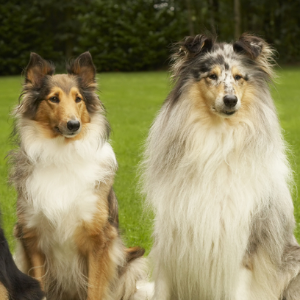
Collie Genetic Health Conditions
-
Degenerative Myelopathy
Degenerative Myelopathy (DM) is a neurological disorder, usually affecting dogs in their senior years. Loss of hind limb coordination is an early sign of disease, and as the condition progresses the hind limbs of affected dogs become increasingly weak.
-
Inflammatory Pulmonary Disease (Discovered in the Rough Collie)
Inflammatory Pulmonary Disease (IPD) is characterized by recurrent airway inflammation, such as pneumonia. The associated genetic variant has been identified in the Rough Collie.
-
MDR1 Medication Sensitivity
The MDR1 gene variant causes a defect to a drug pumping protein that plays an important role in limiting drug absorption and distribution (particularly to the brain). Dogs with the MDR1 variant may have severe adverse reactions to some commonly used medications.
Knowing if your Collie is a carrier or at-risk for these conditions can help you and your veterinarian plan for your pup’s lifelong care. With Wisdom Panel™ Premium, you can get results for over 200 genetic health tests.
Breed Group
Herding
The herding group is a diverse category. These highly intelligent breeds were developed to guard and control the movement of livestock.
Resources
https://www.akc.org/dog-breeds/collie/
http://images.akc.org/pdf/breeds/standards/Collie.pdf
Reviewed July 26, 2020 by Annette Louviere, DVM

































